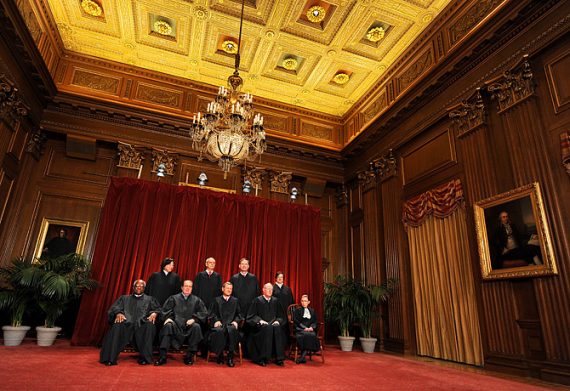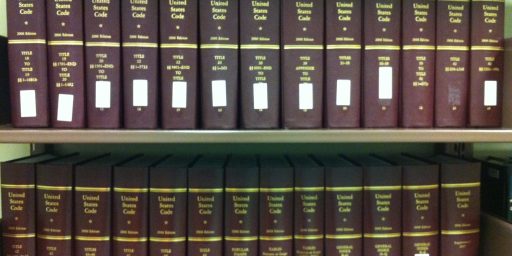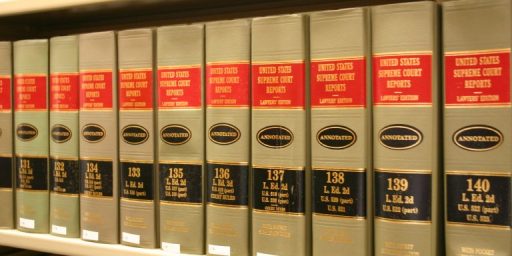Obamacare Subsidies Court Challenge Headed To Supreme Court
Another Obamacare case is heading to the Supreme Court, but it's unclear if they'll agree to hear it, or when they'd hear it if they did.
The plaintiffs who were on the losing side of the argument in the Fourth Circuit’s recent ruling that the Affordable Care Act’s subsidies are not limited only to people who purchased insurance through a state-based exchange are appealing the court’s ruling to the Supreme Court:
The four Virginians whose challenge to Obamacare subsidies suffered a defeat last week are now asking the Supreme Court to hear the case.
Their lawsuit was dismissed by the U.S. Court of Appeals for the 4th Circuit, which ruled that the Obama administration can legally award the subsidies through federally run insurance exchanges — not just those run by the states themselves. The individuals behind King v. Burwell say the subsidies are being improperly awarded through Virginia’s federally run exchange.
Sam Kazman, general counsel for the Competitive Enterprise Institute, said the goal is to get the issue resolved as quickly as possible, since millions of Americans obtaining insurance subsidies could be affected. The conservative group is funding the litigation.
“A fast resolution is also vitally important to the states that chose not to set up exchanges, to the employers in those states who face either major compliance costs or huge penalties, and to employees who face possible layoffs or reductions in their work hours as a result of this illegal IRS rule,” Kazman said in a statement Thursday. “Our petition today to the Supreme Court represents the next step in that process.”
On the same day that King v. Burwell was decided, of course, the Court of Appeals for the District of Columbia handed down its decision in Halbig v. Burwell in which it ruled completely opposite from the Fourth Circuit, finding that the language of the PPACA precluded the Federal Government from providing tax subsidies to people who purchased insurance on the Federal Exchange, something that applies to people living in each of the 36 states that chose not to establish their own state-based exchange. In that case, the Justice Department had announced that they would be seeking an appeal to the full D.C. Circuit Court of Appeals, which is a matter that is entirely within the discretion of the court. Thus, it seems clear that the Fourth Circuit case will be reaching the Supreme Court before the D.C. Circuit case.
Once it gets the Petition for a Writ of Certiorari in the King case, the Court will have a number of options. As a threshhold issue, I think it’s likely that the Court will eventually hear a case raising these issues simply because this is the type of challenge to an important piece of legislation that can’t be left to hang out there for the Circuit Courts to deal with on their own. That doesn’t mean that this specific case will be the one they accept, though. The Court could grant the appeal assuming that there are four Justices who want to accept the case. It could deny the appeal and the ruling of the Fourth Circuit will stand, although the issue would remain unresolved for the rest of the country. Finally, the Court could essentially wait on the appeal until its clear what the D.C. Circuit will do with the case pending before it. Once it receives a Certiorari petition, there is no real time limit within which the Court is required to act and, typically, it doesn’t become clear that a court is ready to act on a case until it has been set for one of the Court’s weekly conferences. Even then, it has become quite common in recent years for the Justices to re-list cases for conferences multiple times before finally deciding on whether or not to take an appeal. In this case, then, the Justices may decide to wait until the D.C. Circuit has ruled on the request for an en banc hearing and, if that request is granted, until after the full D.C. Circuit has decided the case. That way, the Court could hear both cases together. Of course, if this happens, it could mean that we wouldn’t see a hearing on this issue until the term that begins in October 2015, and may not see a ruling until sometime in 2016. Meanwhile, the current law and IRS regulations will remain in place and people who buy insurance on the Federal Exchange will continue to get subsidies under the law.







Can’t the party that hates activist judges just hold another vote to repeal? Must we tie up the judicial branch with this nonsense as well?
@Tony W: They only hate Democratic activist judges. They love their own.
cert. denied
@Tony W:
How is it “activist” to interpret the meaning of a statute passed by Congress? That’s what the courts did here. Judges’ job is to interpret statutes. Refusing to do your job is abdication, not a lack of censurable “activism.”
The liberal superlawyer Tom Goldstein finds both of the competing court decisions plausible, although (not surprisingly given his own personal political tilt) he prefers the Fourth Circuit’s decision (the D.C. Circuit’s decision being more textual, the Fourth Circuit’s being closer to Congress’s likely actual intent).
“Activist judges” is just silly code meaning “judges who made a decision I don’t like.” A stupid concept that should die away (but won’t).
Josh Marshall has a good take with some historical evidence.
http://talkingpointsmemo.com/dc/obamacare-halbig-cbo-scores
@Hans:
That’s a good description of the 4th Circuit decision, but the DC Circuit decision wasn’t textual, it was political. If it were textual, they would have acknowledged the text of the bill was ambiguous. Unfortunately, that doesn’t actually result in a win for the plaintiffs, which is why the DC majority simply decided the matter based on the politics and then tried to rationalize it with some fancy legalese.
@Hans: I suppose we will have to ask our Republican friends why they use the term Activist when they don’t like a decision. It’s not really used in my circle of acquaintances. Interpreting the law is a noble profession – even when I don’t agree with the decision (e.g. Hobby Lobby) I have to respect the institution.
For those who poke their head out of the bubble… there are a LOT of statements from backers and crafters of ObamaCare stating that the subsidies are intended to entice the states to set up their own exchanges, and will NOT be available for those whose states don’t set up the exchanges. Plus, there were versions of the bill that explicitly stated that the subsidies were for all consumers, not just those enrolled in state-established exchanges, and that language was stripped out before the final bill.
But we’re in the age of Obama, where the letter of the law takes a back seat to whatever is expedient now, and subject to change at any moment, so I guess that makes all that stuff that used to be important, now irrelevant.
@Jenos Idanian #13:
More lies as would be expected from Jenos.
@David M: More lies as would be expected from Jenos.
I want to try to rise above such comments, but…
Shove it, punk. Here’s an article explaining how the provision for subsidies on federal exchanges was in the bill, but taken out, and here’s an article showing how one of the key architects of the bill (and was paid $400K for his work) repeatedly stated that the subsidies were intended to entice states to set up exchanges — and how he’s now saying that he repeatedly and consistently “misspoke” when he said that, over and over and over.
In that article, there’s a link to a Youtube audio of Gruber explicitly saying that states that didn’t set up exchanges wouldn’t get subsidies.
So the argument seems to be that the subsidies were to be an incentive to states to set up their own exchanges, with the withholding of federal subsidies if they refused, was only a bluff, and the law didn’t really mean what it says, clearly, and what the backers and authors repeatedly claimed.
A while back Judge Kennedy said that there was a litigation “explosion” in this country with too many unnecessary lawsuits clogging up the courts. He said that the people need to work things out, and should use the political process instead of taking everything to court.So he might throw this one out.
People should be allowed to vote on a lot of these issues instead of some misguided judge deciding things and telling people what to do. Power to the people!
@Jenos Idanian #13: Oh, goody. Arguments resting on the Gruber comment.
• Which he never said anywhere else;
• Which he says was a misstatement;
• Which don’t matter, as even if he thought this NO ONE ELSE DID.
Ron’s link above dispenses with the argument.
@Lee Scoresby: Oh, devastating. If only Gruber had said it more than once…
Oh, look, he did.
And he didn’t just “misspeak.” He spoke at length, in detail, on several occasions, about how the subsidies were intended to entice states to set up exchanges. If there was no relationship between the subsidies and the states setting up exchanges, as people are now arguing, then why would anyone make any connection between them?
And you got nothing to say about the other aspect? The one where the language saying subsidies for all was in there, and then taken out?
“Legislative intent” — here’s a crafter of the bill saying, on several occasions at the time of the debate, that the exchanges were only for states that set up exchanges. His walking it back now is a bit too convenient. Especially when he says, explicitly, that enough states refusing to set up exchanges could kill the plan.
As I read somewhere else, when you pass a bill with zero votes from the opposition, you damned well get it right — because there’s almost no chance that the opposition will help you go back and fix your screwups.
Like, in this case, setting up subsidies as incentives for states to set up their exchanges, and having the rest of the system dependent on enough states going for the carrot. When almost 3/4 of the states either try and fail or just flat-out refuse, then your predictions of what would happen if that happens — even if you thought it was almost inconceivable — you get to see that you were right.
@Jenos Idanian #13:
Shorter Jenos: the Moops were real.
The idea that the Democrats who voted for Obamacare wanted to withhold subsidies from the federal exchanges, is quite simply false. There is zero chance it is true, any claims otherwise are always a lie. Cannon and Adler know this, as does anyone who was conscious and paying attention to the debate when the health care bill was passed. This means paying attention to the Democratic side of the debate and understanding the issues and policies they were concerned with, not the rantings of the charlatans and liars on the right.
@David M: Shorter David M: ignore history, ignore evidence, ignore precedent, and SHUT UP.
I gave links supporting what I said, David. You just mindlessly parrot inadequate talking points.
@David M: The idea that the Democrats who voted for Obamacare wanted to withhold subsidies from the federal exchanges, is quite simply false. There is zero chance it is true, any claims otherwise are always a lie. Cannon and Adler know this, as does anyone who was conscious and paying attention to the debate when the health care bill was passed. This means paying attention to the Democratic side of the debate and understanding the issues and policies they were concerned with, not the rantings of the charlatans and liars on the right.
The Iraqi Information Minister and Jay Carney couldn’t have said it any better. Just assert lies as reality, offer no support, just declare it and let it stand. Don’t go and check for yourself, just take our word for it.
@Jenos Idanian #13:
Given that Gruber’s statements from 2012 are contradicted by everything else he said before and after that, as well as his models, I’d hardly call that evidence. Look I understand why this appeals to you, it’s completely false and also ridiculous, so your get to fulfill your two goals in life, trolling and lying.
Again, the ideas that only the opponents of Obamacare understand the true intent behind the legislation is too stupid for words.
@David M: If you’d like to not sound like a blithering idiot making such bold and pointless assertions, why don’t you dig up a few links to Gruber or other backers of ObamaCare where they explicitly say that the subsidies are available to everyone, not just those whose states set up exchanges? You know, quotes where they talk about the subsidies in such a way that does NOT say that they are there to reward those states that set up exchanges? And just to make it clear, statements dating from the debate and planning before the bill was passed.
Go back and listen to that Gruber audio I linked to. (I’d say “listen again,” but I don’t think you did the first time.) He explicitly says, at length, that the purpose of the subsidies is to entice states to establish their own exchanges, that the states would be depriving their residents of the subsidies if they refused to do so, and that if enough states refused, the entire program would be doomed.
And he said it on at least two separate occasions.
That’s not a “misstatement.” A “misstatement” is like when Obama referred to “my Muslim faith,” and was corrected by the lapdog interviewer into “my Christian faith.” That is a prolonged statement of belief, reinforced by following remarks and elaborations. For him to say it was a “misstatement” is grossly dishonest, insulting, and only plausible to the most gullible of idiots.
Are you self-identifying that readily?
@Jenos Idanian #13:
Regardless of your delusions, Bigfoot isn’t real. You know this, I know this, but lying and trolling is what you do. It’s who you are. A Halbig Troofer.
@David M: I don’t like using this kind of tactic, David, but offer something — anything — of substance or STFU. I posted Gruber saying TWICE that the subsidies were only for those whose states set up exchanges, and you offer exactly NOTHING to rebut it but your own word and really, really, really lame bluster.
As the saying goes, your mouth (or, rather, your keyboard) is writing checks your ass can’t cash, and you don’t even try.
The only question I have is why you aren’t offering anything to back up your argument. Are you so dishonest that you don’t have any, or are you so lazy you can’t be bothered?
@Jenos Idanian #13:
Your claims of seeing a Sasquatch are no more credible than the jokers on the show “Finding Bigfoot”. Your whiny petulance over your lies not being taken seriously is befitting a spoiled child.
@David M: Oh, Davey. I dunno what your Sasquatch fixation is, but I’m starting to wonder if it’s because you somehow found out I wear size 13 shoes.
But it’s really enlightening how you refuse to offer anything resembling substance. Your comments are as empty as your pants and your head.
@Jenos Idanian #13:
No evidence is required to refute a claim as dumb as yours, other than laughter.
@David M: How many different ways are you going to admit you have absolutely nothing?
@Jenos Idanian #13:
You really think you saw Bigfoot? That’s usually taken seriously, but if you insist…
Oh, for Christ’s sake…
anjin, Al, mantis… any of you wanna dig this idiot out of his hole? He can’t even recognize how badly he’s beaten himself.
@Jenos Idanian #13:
Your claim is just as ridiculous as a Bigfoot sighting. There is literally no difference, so why give your lies any more credence?
@Jenos Idanian #13:
Then it should be easy for you to provide such statements that are not contradicted by their later, but pre ACA passage statements.
Gruber when writing extensively in 2011, well before the lawsuits, made no mention of this supposed penalty on states that did not build their own exchanges. No lawmaker who supported the bill that I am aware supported your idea of how this was meant to work. States like Hawaii that have small populations, but vote reliably democratic didn’t interpret it that way when they chose to use the federal exchanges. Our entire delegation voted for the bill. One would think that if they intended this penalty they would have warned us off of using the federal exchange. They did not. Why do you think that is?
@Grewgills:
link for Gruber’s report